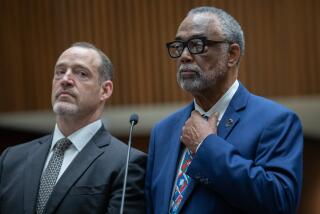Q&A: ‘Whiting out’ meeting minutes could be illegal
Question: Our homeowners’ association meeting minutes are a joke and don’t reflect what goes on. At meetings, owners play “guessing games” and question our finances. For several years, owners have sent specific written requests for books and records. First, the manager delays; then, she takes our requests and calls the association’s attorney, who finds any legal technicality and loophole in the law to stonewall, then deny requests again.
Every denied request ends up being put into categories of “attorney-client privilege,” “related to an incident connected to litigation” or “invasion of a board member’s privacy.” The alternative: Documents are “sanitized” beyond recognition, then photocopied. Everything is whited out except a date or odd words on the page. Sometimes the entire document is whited out, leaving only the date and a signature.
When we take the HOA to small claims court for denied document requests, the manager shows up with emails she supposedly sent us that are fake, lies about what was said and claims to have offered us numerous opportunities to inspect all records and documents. She brings in boxes of files, telling the judge they are proof of constant “harassment” of the board by owners, claiming owners look to make money off the association. She is experienced at “muddying the waters” with bogus and contrived paperwork prepared specially for these court appearances. She is such a good liar in court and expert at confusing the issues and the judges that the owners lose, even though we’re thoroughly prepared. Our association attorneys seem to be our worst enemy. It’s a quid pro quo situation between the manager and attorneys with owners getting the shaft. What do owners do?
Answer: Unfortunately, owners often wait too long before springing into action to stop these machinations. Titleholders have an obligation to police their board and management and to take swift action toward remedying abuse of power.
Minutes are vital to the association’s knowledge base and also serve as proof of association business and compliance with state and corporate laws. If minutes can be challenged, so too can the business conducted during those meetings. So serious are board meeting minutes that they are prescribed in Corporations Code section 7215 as prima facie once signed by the secretary. Prima facie means courts accept these documents into evidence at face value, making accurate association minutes imperative to association governance. Even more reason for owners to attend meetings, taking their own notes in the event of a challenge.
Corporations Code section 8333 gives owners the right to inspect accounting books and records and minutes of proceedings of the board and committees of the board. All association business, including corresponding with the board, must be documented in writing. When falsified documents are admitted into evidence, somehow, bring the discrepancies to the court’s attention. If you know in advance that this is occurring, prepare a document detailing “fraud upon the court,” then file it at court as part of your case against the association. Should fraud be perpetrated at the trial level, prepare a “fraud upon the court” brief and send it to the judge during or after. Evidence Code section 413 allows the judge or jury hearing your case to consider any evidence you present concerning suppression of evidence in making a final ruling on the matter.
Civil Code section 5215 details what can and cannot be redacted in association documents. Liberally using a “whiting out” fluid in an attempt to erase, disguise and/or alter documents for the purpose of misleading owners and the court could be construed as fabricating evidence.
Under Penal Code section 132, it is a felony to offer in evidence as genuine or true any book, paper, document, record or other written instrument knowing it to have been forged, fabricated, fraudulently altered or ante-dated. It is also a felony under Penal Code section 134 to prepare and produce any false documentary evidence during a trial, proceeding or inquiry authorized by law.
Falsifying or tampering with association reports or records, including minutes, is a violation of a director’s duties under Corporations Code section 8215 with attendant penalties pursuant to Corporations Code section 8813. Even though it is the manager perpetrating these acts, the board directors are held liable because they have a nondelegable duty to supervise vendors and employees, including managers acting as agents for the association.
Utilize the petition process to remove the board, elect another, and terminate or prosecute the manager. A police report can be filed concerning this manager’s actions while requesting prosecution under Penal Code section 135, which imposes criminal penalties on anyone who destroys or conceals evidence in a legal proceeding.
Zachary Levine, partner at Wolk & Levine, a business and intellectual property law firm, co-wrote this column. Vanitzian is an arbitrator and mediator. Send questions to Donie Vanitzian JD, P.O. Box 10490, Marina del Rey, CA 90295 or noexit@mindspring.com.






